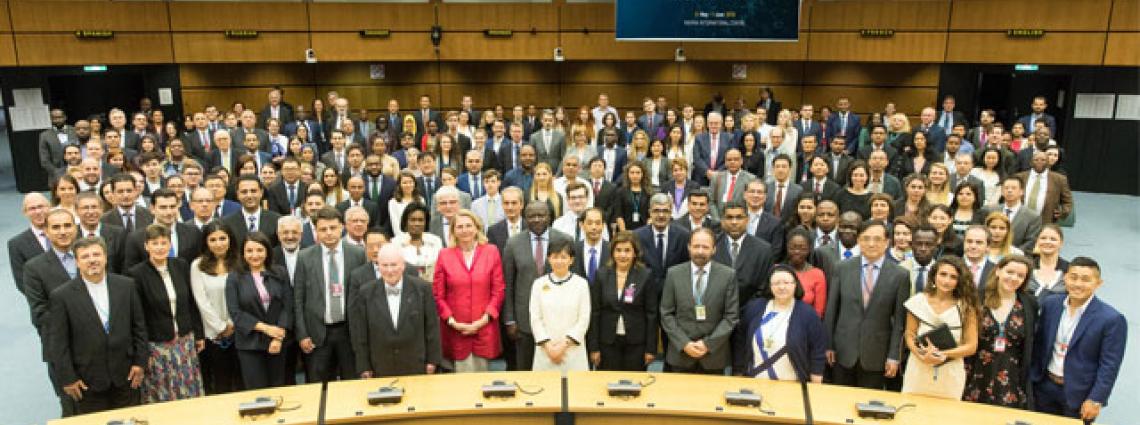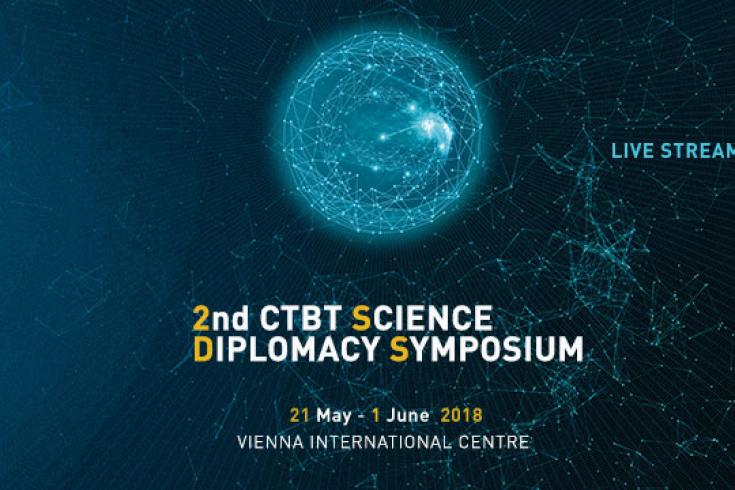2nd CTBT Science Diplomacy Symposium
A successful 2nd CTBT Science Diplomacy Symposium wrapped-up on Friday, 1 June following two weeks of dynamic discussion sessions, a high-level session of keynote speeches, hands-on simulation exercises and a field trip to the Atominstitut at the Vienna University of Technology.
With their relentless enthusiasm and creativity, the CTBTO Youth Group (CYG) participants—more than forty from around the world—were key to the success of the 2nd CTBTO Science Diplomacy Symposium. In addition to their active participation in discussion sessions and simulation activities, CYG participants held several side events during the Symposium. One of these events was dedicated to unveiling the first edition of NEWSROOM—a periodical produced by members of the CYG to inform and argue for the CTBT’s entry into force – and to explore how to frame and enlarge the debate about nuclear non-proliferation and nuclear disarmament.
Reaching out to the Francophone communities, another highlight of the Symposium included a high-level Francophone roundtable discussion-- TICE: science et diplomatie au service de la sécurité et du développement. Moderated by RFI journalist Alain Foka, the roundtable included interactive dialogue among the participants: CTBTO Executive Secretary Lassina Zerbo; Jean-Louis Falconi, Permanent Representative of France; Marcel Fortuna Biato, Permanent Representative of Brazil; Lotfi Bouchaara, Permanent Representative of Morocco; Willem Van de Voorde, Permanent Representative of Belgium; and Michelle Ndiaye, Director, Africa Peace and Security Programme, Institute for Peace and Security Studies; Head of Secretariat, Tana High-Level Forum on Security in Africa.
A high-level session on 25 May featured keynote speeches by an all-female panel, including: Karin Kneissl, Federal Minister for Europe, Integration and Foreign Affairs of the Republic of Austria; Elba Rosa Pérez Montoya, Minister of Science, Technology and Environment of Cuba; and Izumi Nakamitsu, UN High Representative for Disarmament Affairs. This session was introduced by CTBTO Executive Secretary Lassina Zerbo and Ambassador Maria Assunta Accili Sabbatini, CTBTO PrepCom Chair and Permanent Representative of Italy to the United Nations in Vienna. The speakers stressed the contributions of the CTBTO’s IMS to international peace and security, and highlighted the importance of preserving the norm against nuclear testing.
Now more than ever, this type of diplomacy has a particular importance. The challenges that define the 21st century such as nuclear disarmament, climate change, food security, and poverty reduction have scientific dimensions. No country will be able to solve these problems by itself; those are global troubles which require global solutions and collaboration.
We have to benefit from women’s contributions, as has always been the case in history, and I’m pleased to be a part of this all female panel today. Women must be fully involved in disarmament negotiation and decision-making processes. We must also empower young people of today, as they are the ultimate force for change in the world.
There was also an expert dialogue on “Assessing the Current Global Security Context: Successes, Challenges, and Possible Ways Forward” with Desmond Browne, Vice-Chairman of the Nuclear Threat Initiative and former UK Secretary of State for Defence and Michelle Ndiaye , Director of the Africa Peace and Security Programme, Institute for Peace and Security Studies and Head of Secretariat, Tana High-Level Forum on Security in Africa. Participants actively engaged with the expert panellists with probing questions on a wide range of issues.
The Symposium’s aim was to raise public awareness of the CTBT's contribution to international peace and security, and to encourage cooperative and collaborative research and innovation on nuclear test monitoring science and technology. The Symposium sought to stimulate creative thinking about possible political, legal and diplomatic solutions among diplomats, practitioners and policy makers, academics, and the next generation to the challenges facing the Treaty. With an emphasis on youth, over 40 members of the CYG from across the globe participated in the Symposium. CTBTO Group of Eminent Persons (GEM) members will also participated and lent their expertise to discussions.
These are interesting times where the global ban on nuclear tests in concerned. …Perhaps current events help account for the high interest in our Symposium. We have some 350 registered participants – online and offline – from all corners of the globe. With the exception of DPRK, we have in attendance … all Annex 2 States still to ratify the Treaty.
A further highlight of the Symposium was the simulation exercise—on 31 May and 1 June—which allows participants to take part in a mock CTBTO Executive Council deliberation over an on-site inspection request, enabling them to apply concepts and ideas discussed during the Symposium, and deepen their understanding of the Treaty and the Organization.
In addition to lectures, panel discussions, and hands-on demonstrations, the Symposium included site visits, an exhibit of the CTBTO OmniGlobe, IMS Station models, and the 360 ?virtual reality film installation “Collisions”, featuring an Australian indigenous elder who experienced nuclear testing in his homelands.
31 May 2018

